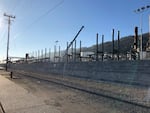Opponents of a Portland crude oil terminal gathered in front of City Hall Wednesday morning to protest its plans to bring more oil trains through the city.

Protesters including the Raging Grannies, as well Oregon Physicians for Social Responsibility, Friends of the Columbia Gorge and high school students from the Portland Youth Climate Council, gathered in front of City Hall on Wednesday, March 13, to oppose the expansion of Zenith Terminals, which could increase the number of oil trains moving through Portland.
Tony Schick / OPB
About 50 people joined in singing, speechmaking and sign-waving to protest construction at Zenith Energy terminal along the Willamette River.
Zenith's construction will greatly expand its rail capacity, allowing the company to increase its handling of heavy crude oil from Canada, which it loads onto ships for export.
The rally included singing protesters who call themselves Raging Grannies, as well Oregon Physicians for Social Responsibility, Friends of the Columbia Gorge and high school students from the Portland Youth Climate Council.
They called on Zenith to halt its plans and on city leaders to intervene.

Construction continues at the Zenith Terminals site in Northwest Portland in early February, 2019.
Tony Schick / OPB
“We need our leaders to stand up for what is right. We need to stop the expansion of dirty fossil fuels and to create a world that embodies climate justice, equity and sustainability,” Solomon Duke, a senior at Franklin High school and a member of the climate council, said. “We don’t have to take this gorgeous world away from our children.”
Portland’s City Council voted in 2016 to oppose new fossil fuel infrastructure. However, by that time Zenith had already received building permits for the current construction.
Portland Commissioner Chloe Eudaly spoke at the event, saying the council and the mayor were working to oppose Zenith’s expansion.
“It would create an environmental catastrophe for our citizens and place an undue financial burden on our taxpayers,” Eudaly said. “I’m firmly opposed to this proposed Zenith expansion.
Eudaly had no details on how what action the city could take, but added that the mayor’s office was examining the issue.
Megan Mastal, a public relations representative for Zenith, did not directly address the opposition in an emailed statement. The company called the construction a “modernization project” that would increase the safety and efficiency of the facility.
She said facility upgrades include a biofuels component, which Zenith is trying to grow as part of its business.
“Our business is meeting a key economic need while providing family-wage jobs with benefits,” Mastal said. “We operate with a focus on safely and in accordance with all regulatory requirements; in fact, many aspects of our current improvement project are above and beyond what is mandated.”
